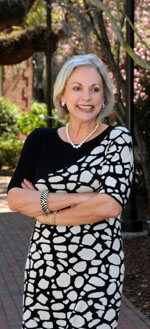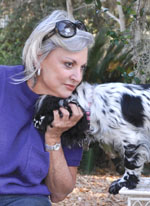|
King
lends style, experience to role in public
relations
By Dawn Brazell
Public Relations
Whether it's dancing with
President Ronald Reagan or in the hot seat with Larry King, Sarah King
exudes grace under pressure.
 Dr. Sarah King Dr. Sarah King
It's a gift that has
served her well through the years, particularly as MUSC's director of
the Office of Public Relations. King, DHA, is one of four women
selected at MUSC to be honored as part of National Women's History
Month as women who exemplify leadership qualities and who make
significant contributions in their fields.
Becoming a strong leader
really wasn't an option for King, whose father's diplomatic and
military career had her in training at an early age. Born in Fort
Riley, Kansas, she lived in six states before she was 8. Then it was
off to Europe, where she attended a boarding school in Switzerland,
getting a crash course in French and German so she'd be able to make
friends. She remembers it as a lonely, but exciting time and one of
many lessons she'd have in life on the value of adaptability.
It was a lesson her mother
taught her as well.
Her mother, who's from
Poland, survived the invasion of the Russians at age 12 and lived in
the woods with resistance forces for two years. "Then the Nazis came
into Poland, and she never saw her family again after that."
King said her mother
taught her and her sister to be strong and independent. They could move
from continent to continent, and within a week she'd have them all
resettled. Her mother, a fabulous hostess, speaks five languages.
"She's one of the most
brilliant people I've ever met and she's always happy, which is strange
given all that she went through as a child. She's elegant—just very
elegant."
King returned to the
States with her family at age 13, eventually settling in Atlanta, Ga.,
where her father retired to do management consulting.
"He had this great idea
about servant leadership long before anyone else was talking about it.
I got to go to a lot of the lectures. It's funny how life comes full
circle because 40 years later my doctorate was in leadership. So much
of what was taught was stuff that would echo from Daddy years and years
ago."
Up
in the Air
King, who would go on to get her doctorate in healthcare administration
and policy from MUSC in 2007, thought medicine might be her chosen
field when she first started her college studies. She attended one of
her pre-medicine classes where they watched a baby being born on film.
She laughs. "I walked out of the classroom and passed out and decided
I'd better change my major."
Graduating from the
University of Georgia with degrees in clothing and textiles and
interior design, her path took another turn. On a whim, she and a
friend saw an advertisement about TWA hiring hostesses. It was back
when such jobs were glamorous and the competition tough, with only one
in 5,000 women interviewed being hired.
"Just on a lark, we
decided to go try for it. That's back when they had weight
requirements, and you had to wear fake eyelashes. You had to wear a
girdle so you wouldn't shake when you walked down the aisle. If you had
chipped nail polish or a run in your hose, you could be fired on the
spot. It was a whole different world back then."
King's mother was
appalled. In her first act of rebellion, King decided to try it for six
months anyway.
"When I first started
flying for the airlines, my mother cried copiously. 'I can't believe
Swiss finishing schools and
colleges so you can be a
cocktail waitress in the sky.'"
King rose in management, and eventually ended up working for Eastern
Airlines where she became involved with public relations and the
marketing of new destinations. "When Eastern went out of business, my
mother was crying again. It's the second time she's cried, 'How can you
do this to us?' They got so used to the passes. I could never please
her," she said, laughing.
In the early '80s, King
worked as a news producer for the BBC and Professional Video Services
in Washington, D.C. and learned about journalism and broadcast. At
about the same time she met who was to become one of the most
influential role models in her life, activist Gloria Steinem, who
taught her the fine art of handling media.
She perfected skills she
would come to need as she became one of the founders of Mothers
Alliance for the Rights of Children (MARC), an advocacy organization
that fights for legislation to protect abused children. King was drawn
to the cause by the case of a friend. The more she learned about the
extent of the problem and ignorance in the nation, the madder she got.
"We go and fight wars for
democracy because we're so great, but yet we allow children to be
sexually abused or starved, and we send them right back to abusive
situations. It made me sick. It just made me sick."
King, a self-described
zealot in this area, poured her energy into advocacy work, pushing for
legislative advances to provide for more protection, appearing on such
television shows as "60 Minutes" and "Larry King Live" to raise
awareness, and working with Lynda Carter of Wonder Woman fame as the
cause's spokesperson.
Still active in supporting
MARC, King has received high praise for her work. Steinem, who publicly
named King as one of her three heroes, once praised her friend's
advocacy efforts saying that no one has done more to save the lives and
hearts of others.
MUSC President Ray
Greenberg, M.D., Ph.D., said one feature he admires about King is how
she approaches all
aspects of her life—at
work, at home, and in the community—with great passion and commitment.
"Her active pursuit of community service gives her exposure to issues
and concerns beyond the walls of the campus and helps to inform us
about how we can more effectively communicate about the medical
university. She networks well with the local media and is seen by
them as an honest broker of information."
Queen
of
Style
King's wardrobe reflects her belief in wearing classics. Selected by
Glamour Magazine in college as one of four best dressed coeds in
America, King has moved through the decades without losing her sense of
style.
"What I appreciate most is
individual style—whether it's home or clothing. I like people who know
themselves well enough to work and live doing what they are comfortable
with. If no one likes it, I don't care —as long as I am feeling OK with
it."
Keeping a gratitude
journal, King said she feels blessed to have had so many opportunities
in life. Having done everything from dancing with former President
Ronald Reagan at the White House to flying Cessna planes, she's content
with the places she's been and the things she's been able to do. Her
proudest accomplishment is her three children. Her soft spot is
animals. She owns two parrots and four dogs.
 Dr. King with
her dog, Molly Dr. King with
her dog, Molly
She smiles. "My kids think
my hobby is rescuing dogs."
Of all the jobs she's
done, one of her favorite roles remains being the owner and manager of
Interiors by Design in Summerville, a job she held in the mid '80s. One
of her most fulfilling, though, has been her current one as public
relations director.
King said she never had
thought about working at MUSC, but when she became the first woman
candidate for Congress in the history of the state in 1994, it brought
her to the attention of former MUSC President James B. Edwards, DMD.
"When it was over, [Mark] Sandford won, but Dr. Edwards called me and
said, 'I'd like to talk to you about working in P.R. I didn't vote for
you, but I liked the way you ran your campaign.'"
Involved in her advocacy
work, King wasn't looking for a full-time job. What changed her mind
was the challenge Edwards set before her.
"I liked him very much and
he said, 'We're seen as a bunch of brick buildings, and I'd like for
people to have a friendly feeling toward MUSC, and your campaign felt
friendly."
When she first started
here, she told Edwards what really would help was for everyone to have
flight attendant training. She laughs. "Of course, he thought I was
insane," she said, adding that she got her point across that MUSC
needed to set the bar higher for the quality of service expected.
"How you treat people is
the most important part of life—people and animals. It says everything
about who you are. It's not what you're wearing or what you look like
or what your title is. How you open up in your heart and care about
someone else is how you are judged."
King said she loves her
job. She especially enjoyed her role in facilitating MUSC's outreach
efforts in helping Poland launch a breast cancer awareness program.
Globally and locally, MUSC does so much, she said.
"It's been better than I
expected and easier. MUSC has so many great stories. The hard part is
getting them all out. What I love most about our department is that we
affect hundreds of thousands of people by getting out the news of how
their quantity and quality of life can be improved. That's a gift to be
able to do that."
King said she feels
fortunate to have had great mentors in her life. She once tried to
thank her friend Steinem for all that she had taught her, but she
stopped her.
"'If you want to thank me,
just pass it on.' I have found that to be true because there are always
opportunities to pass it on, and it can be so rewarding in how it can
come back. Everything you say—everything you do—has a ripple effect on
the world."
Women's
History Month
"Our History is our Strength"
A panel discussion will be held from noon
to 1 p.m., March 31, Room
100, Basic Science Building
Romina McCandless
has
worked with the Latino community in Charleston as a medical assistant,
an emergency medical technician and as a medical interpreter. She began
working with the MUSC College of Nursing’s Hispanic Health Initiative
in 2009 as a graduate intern.
Dale Rosengarten
is
curator of the Jewish Heritage Collection at the College of Charleston
where she also teaches in the Jewish Studies Program.
Teresa Gore
is a member of
the Santee American Indian Tribe of the areas surrounding Holly Hill.
She is the founder and director of an organization whose mission is to
honor the historical and contemporary contributions of American Indians
in S.C.
Joyce Coakley
is a
Charleston native, skilled sweetgrass basket maker, historian, and
fluent speaker of the Gullah language. She is president co-founder of
the Sweetgrass Cultural Arts Preservation and owner-designer of
Sweetgrass Baskets by Design.
|




